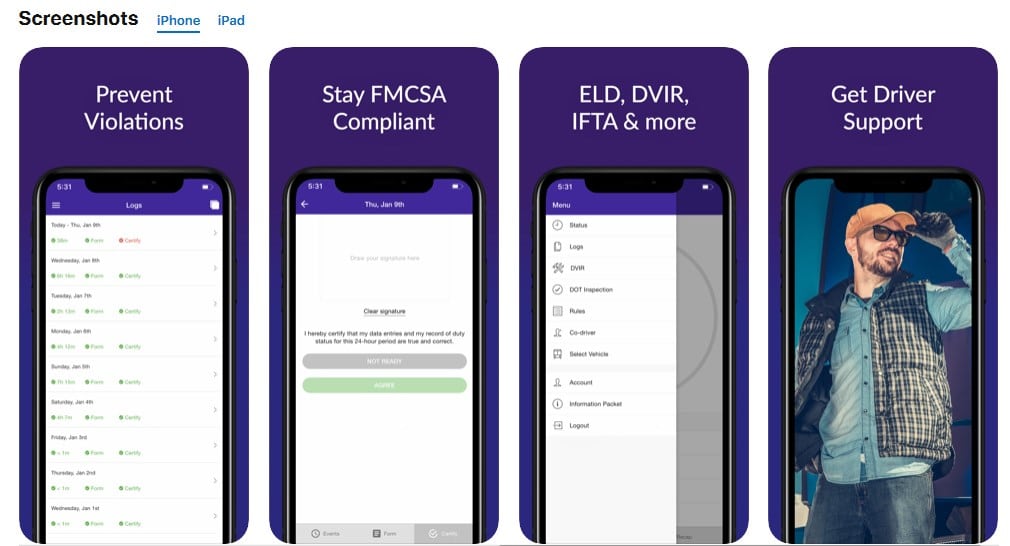The Federal Motor Carrier Safety Administration (FMCSA) implemented the Electronic Logging Device (ELD) mandate several years ago with the goal of improving road safety. The mandate requires most commercial drivers to use ELD solutions for capturing engine data and managing hours of service (HOS).
ELD compliance remains a critical aspect of fleet operations today. These devices continue to play a central role in HOS management, helping fleets maintain regulatory adherence and supporting the FMCSA’s safety initiatives. As the trucking industry evolves, staying current with ELD requirements and leveraging these systems effectively is crucial for operational success and legal compliance.
Do you have any questions? Talk to ELD Advisor: 650-405-3372 or Request Callback
Full Enforcement and Ongoing Impact
The ELD mandate is now fully implemented across the United States, with strict enforcement in place. Today, the focus has shifted from implementation to consistent compliance and leveraging electronic logbooks for operational benefits.
Key aspects of ELD enforcement include:
- Roadside inspections. Drivers must be prepared to present their electronic logs and transfer data to safety officials when requested.
- Data transfer methods. ELDs must support either wireless web services and email or USB and Bluetooth transfer methods. Ensuring your system can perform these transfers correctly is crucial for passing inspections.
- Supporting documents. While electronic logs have reduced the need for paper logs, drivers are still required to keep certain supporting documents. These may include bills of lading, payroll records, or fuel receipts.
- Personal conveyance. Drivers must be familiar with the proper use and logging of personal conveyance time.
- Cybersecurity concerns. As ELDs collect and transmit sensitive data, the FMCSA has emphasized the importance of cybersecurity. Fleets should ensure their providers employ robust security measures to protect against data breaches.
- Exemptions and flexibility. While most commercial drivers must use electronic logbooks, it’s important to stay informed about current exemptions, such as those for short-haul operations or older vehicles.
- Compliance reviews. The FMCSA conducts compliance reviews, which now heavily rely on ELD data. Accurate and consistent ELD use is crucial for passing these reviews.
- Driver training. Ongoing driver training on proper ELD use remains essential. This includes understanding how to annotate logs, use special driving categories, and troubleshoot common issues.
The ELD mandate continues to shape the trucking industry, influencing everything from day-to-day operations to long-term strategic planning. As technology evolves and regulations are refined, staying informed about elog requirements and best practices is crucial for fleet success.

Does Your Business Need a Better ELD Solution?
As the ELD mandate has become an established part of the industry, some fleets may be considering whether their current solutions best meet their needs. The FMCSA maintains a list of registered ELD solution providers on its website. It’s important to note that these providers are self-certified, so truckers and fleet managers should conduct their own due diligence to ensure their chosen HOS ELD solution remains compliant.
To assist in the selection process, the FMCSA offers a checklist titled “Choosing an Electronic Logging Device.” Any ELD product lacking items on this checklist should not be considered a valid HOS ELD solution.
Three key things to look for in an ELD
While the checklist is a good starting point, it mainly addresses compliance issues. Truckers can narrow down their search by looking for three key features that will improve your experience:
- Positive user reviews. These are posted on various online platforms. It is important to consult unbiased sources like the App Store for iIOS-based services or Google Play Store for Android products.
- Ease of use. If independent truckers or fleet drivers are frustrated with the electronic logbook, they won’t use it properly, risking the chance of non-compliance.
- Efficient customer support. When issues arise or you need help dealing with your system, you want your provider to be easy to reach and prepared to help. Test-calling their support line should let you know how accessible their technical assistance is and how knowledgeable their reps are.

Three red flags to avoid in an ELD
Just as there are things to look for in an HOS ELD solution, there are also some red flags to be aware of:
- Proprietary hardware. Some providers provide their own tablets to manage HOS records, which is usually more expensive than bring-your-own-device (BYOD) systems. Devices that aren’t compatible with smartphones and tablets may limit flexibility and efficiency.
- Forceful contracts. A contract that is longer than one year can be a red flag, as they may limit your options for changing providers. Some providers ask for three to five-year commitments, which is a long time, especially in the case of technology.
- Hidden fees. When providers are vague about their pricing structure, carriers could end up having to pay “hidden” fees. Pricing should be completely transparent, without additional charges for activation, installation, implementation, or other basic services.
HOS247 Is an Industry Leader Providing ELD Services
HOS247 has established itself as a reliable ELD service provider, offering a range of features designed to meet the needs of both fleets and owner-operators. Our commitment to user-friendly technology and exceptional support offers the following benefits for carriers:
- Durable hardware. HOS247 provides robust, reliable hardware with a one-year warranty.
- Top-rated customer service. Knowledgeable support representatives are available seven days a week to assist users with any issues or questions. Our support team is fluent in English, Spanish, Polish, and Russian, ensuring clear communication for a diverse user base.
- User-friendly interface. The system is designed with drivers in mind, promoting ease of use and smooth integration into daily operations.
- Automatic updates. The system regularly updates to ensure compliance with changing regulations and to introduce new features.
- Durable hardware. HOS247 provides robust, reliable hardware with a one-year warranty.
- Device flexibility. The HOS247 app is available for both Android and iOS devices, allowing users to use their preferred smartphones or tablets.
- Customizable plans. HOS247 offers scalable solutions to fit the needs of both small owner-operators and large fleets. Payment can be made monthly or yearly.
- No long-term contracts. HOS247 offers flexible agreement terms without binding users to extended commitments.
- Trial period. A two-week return policy allows users to test the system risk-free.
HOS247 aims to not only ensure ELD compliance but also to provide tools that can enhance overall fleet management and efficiency. The combination of robust technology and responsive customer support positions HOS247 as a solution capable of meeting the evolving needs of today’s trucking operations.

ELD Solutions Must Support Trucking Exceptions
As mentioned previously, commercial truckers can be exempt from certain HOS rules under specific conditions. Here’s an overview of the main exceptions:
- 30-minute break exception. This exception applies to the rule requiring drivers to take a 30-minute break after 8 hours of driving time. Short-haul drivers are excepted from this requirement if they:
- Operate within a 150 air-mile radius of their normal work reporting location.
- Do not exceed a maximum duty period of 14 hours This exception applies to both CDL and non-CDL drivers who meet these criteria.
- 16-hour short-haul exception. This allows drivers to extend their driving window from 14 to 16 hours once every seven consecutive days. Property-carrying truckers can use this exception if they:
- Have returned to their normal reporting location and been released from duty at that location for their previous five duty tours.
- Return to their normal reporting location and are released from duty within 16 hours of coming on duty, following 10 consecutive off-duty hours.
- Haven’t used this exception in the previous six consecutive days.
- Adverse driving conditions exception. This excepts drivers from the 11-hour driving limit for property-carrying truckers (10 hours for passenger-carrying drivers). It allows an extension of up to two hours when unforeseen adverse driving conditions are encountered.
- Direct emergency assistance exception. HOS rules can be temporarily suspended during certain emergency situations declared by the president, state governor, or Federal Motor Carrier Safety Administration (FMCSA). Without such a declaration, the exception doesn’t apply. In valid emergencies, drivers can complete their run without violating HOS regulations, provided the run could have been completed absent the emergency.
These exceptions are crucial for maintaining flexibility in the trucking industry while ensuring safety. ELD solutions must be capable of accurately tracking and recording these exceptions to ensure compliance and operational efficiency.
Do you have any questions? Talk to ELD Advisor: 650-405-3372 or Request Callback
HOS247 Offers Additional Features to Enhance Trucking Operations
While HOS247 provides all standard ELD features required by the mandate, it also goes above and beyond by offering additional tools to make trucking operations more efficient and successful. Some of these features include:
- GPS fleet tracking. Enables real-time vehicle location monitoring, route optimization, and driver performance analysis, helping improve overall fleet efficiency and reduce fuel costs.
- IFTA mileage reporting. Automatically calculates mileage by jurisdiction, significantly reducing the administrative burden of IFTA reporting and minimizing the risk of errors in mileage calculations.
- Vehicle diagnostics. Provides real-time alerts for potential vehicle issues, helping prevent breakdowns and reduce maintenance costs.
- Fault code detection. Identifies and reports engine fault codes, allowing for proactive maintenance and reducing the risk of unexpected vehicle downtime.
- Vehicle maintenance alerts. Sends notifications for scheduled maintenance based on mileage or time intervals, ensuring timely upkeep of the fleet.
- Idle time monitoring. Identifies instances of excessive idling to help reduce fuel waste and emissions, contributing to cost savings and environmental responsibility.
While ELDs are primarily implemented for regulatory compliance, these features are designed to provide a comprehensive fleet management system that delivers real operational benefits. Savvy fleet managers can use ELD data to gain valuable business insights. By analyzing driving patterns, idle time, and fuel consumption, companies can identify areas for improvement in their operations.
In this way, electronic logbooks contribute to improved fleet efficiency and driver performance. Real-time tracking allows for better route optimization and more accurate estimations of arrival times. This data can also be used to recognize and reward top-performing drivers, fostering a culture of excellence within the organization.
The cost savings and return on investment (ROI) from elog features are significant. Automated record-keeping reduces administrative overhead, while improved route planning leads to fuel savings. Additionally, features like maintenance tracking can prevent costly breakdowns and extend vehicle lifespan. When considering these benefits, it’s clear that a comprehensive ELD solution like HOS247 provides value far beyond mere compliance.

Best Practices for Long-term ELD Success
To ensure long-term success with ELD implementation, trucking companies should focus on continuous training and education for drivers and staff. Regular refresher courses on electronic logbook usage and updates on changing regulations help maintain compliance and maximize system benefits. This ongoing education also helps address any concerns or resistance to technology adoption among drivers.
Regular system updates and maintenance are crucial for optimal elog performance. Fleet managers should work closely with their ELD provider to ensure all software and firmware are up-to-date. This not only ensures compliance with the latest regulations but also provides access to new features and improvements.
Utilizing ELD data for strategic decision-making is key to long-term success. By analyzing trends in driver behavior, vehicle performance, and operational efficiency, companies can make informed decisions about fleet expansion, route planning, and resource allocation. This data-driven approach leads to more efficient operations and improved profitability.

Conclusion
Selecting the right ELD solution is crucial for trucking companies aiming to thrive in today’s competitive environment. While compliance with the ELD mandate is non-negotiable, the benefits of a comprehensive system extend far beyond meeting regulatory requirements. Solutions like HOS247 offer a range of features that improve operational efficiency, reduce costs, and provide valuable business insights.
By leveraging advanced elog capabilities, trucking companies can optimize their operations, improve driver satisfaction, and boost their bottom line. The data provided by these systems is invaluable for making informed strategic decisions that drive business growth.
As the industry continues to evolve, it’s essential for trucking companies to regularly evaluate and optimize their electronic logbook usage. By choosing a reliable provider and following best practices for implementation and ongoing use, fleets can turn a regulatory requirement into a powerful tool for business success. Don’t settle for basic compliance – harness the full potential of your ELD system to drive your business forward.

I’ve co-founded, built and managed several transportation-related businesses. Now, I’m a founder and CEO of HOS247 – an AI Transportation Platform for trucking companies, freight brokers and other logistics operations. We are transitioning old-style operations to technology-advanced logistics entities and help them to grow their businesses. ELDs (electronic logging devices), fleet tracking and management 2.0 combined with AI-powered dispatch tools.












Finding a guaranteed compliant DOT ELD may be challenging in the US. Manufacturers of electronic logging devices certify their own products based on the technical requirements established by FMCSA. Unfortunately, even elogs officially registered in the DOT ELD list may

Trucking companies have much to gain by using a GPS tracker for commercial vehicles. Logistics and overall business performance can reach a new level of productivity thanks to this technology. By having a bird’s eye view of ongoing operations, drivers,

A driving log app is the component of an electronic logging system that allows drivers to visualize and manage hours of service electronically. Log apps allow drivers to visualize and manage the HOS data captured by the tamper-free hardware piece